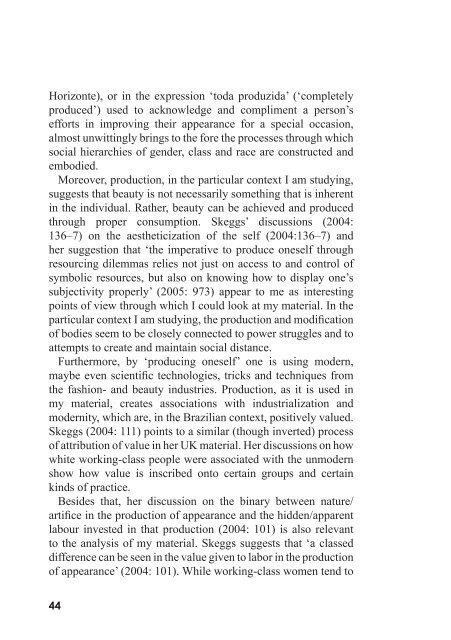Thinking with Bevereley Skeggs - Stockholms universitet
Thinking with Bevereley Skeggs - Stockholms universitet
Thinking with Bevereley Skeggs - Stockholms universitet
- No tags were found...
You also want an ePaper? Increase the reach of your titles
YUMPU automatically turns print PDFs into web optimized ePapers that Google loves.
Horizonte), or in the expression ‘toda produzida’ (‘completelyproduced’) used to acknowledge and compliment a person’sefforts in improving their appearance for a special occasion,almost unwittingly brings to the fore the processes through whichsocial hierarchies of gender, class and race are constructed andembodied.Moreover, production, in the particular context I am studying,suggests that beauty is not necessarily something that is inherentin the individual. Rather, beauty can be achieved and producedthrough proper consumption. <strong>Skeggs</strong>’ discussions (2004:136–7) on the aestheticization of the self (2004:136–7) andher suggestion that ‘the imperative to produce oneself throughresourcing dilemmas relies not just on access to and control ofsymbolic resources, but also on knowing how to display one’ssubjectivity properly’ (2005: 973) appear to me as interestingpoints of view through which I could look at my material. In theparticular context I am studying, the production and modificationof bodies seem to be closely connected to power struggles and toattempts to create and maintain social distance.Furthermore, by ‘producing oneself’ one is using modern,maybe even scientific technologies, tricks and techniques fromthe fashion- and beauty industries. Production, as it is used inmy material, creates associations <strong>with</strong> industrialization andmodernity, which are, in the Brazilian context, positively valued.<strong>Skeggs</strong> (2004: 111) points to a similar (though inverted) processof attribution of value in her UK material. Her discussions on howwhite working-class people were associated <strong>with</strong> the unmodernshow how value is inscribed onto certain groups and certainkinds of practice.Besides that, her discussion on the binary between nature/artifice in the production of appearance and the hidden/apparentlabour invested in that production (2004: 101) is also relevantto the analysis of my material. <strong>Skeggs</strong> suggests that ‘a classeddifference can be seen in the value given to labor in the productionof appearance’ (2004: 101). While working-class women tend to44
















